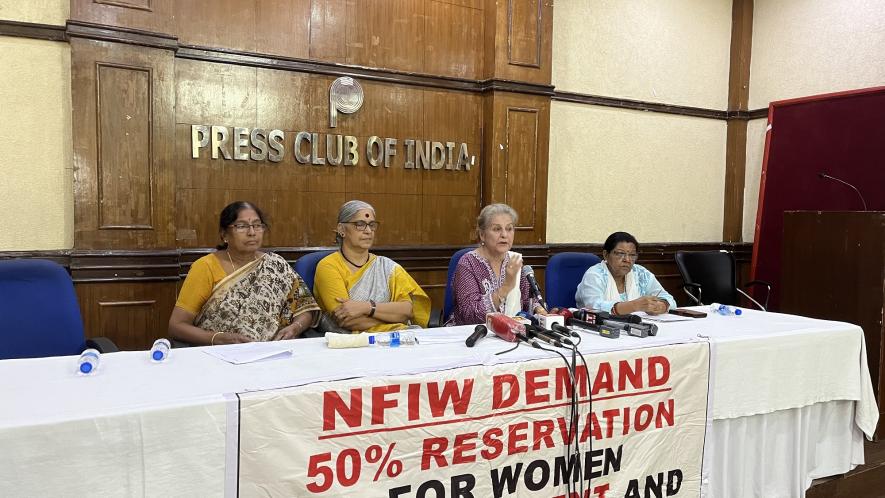Women's Reservation Bill Good but Lacks Spirit of Empowerment, say Women's Organisations

Women's Reservation Bill
The women's organisations on Tuesday said that the trajectory of the Women's Reservation Bill under the Narendra Modi government suggests that it appears to be an electoral move rather than an empowering measure with several significant loopholes. Union Law Minister Arjun Ram Meghwal on Tuesday introduced the Women's Reservation Bill through the 108th Constitutional Amendment.
The bill's statement of objects and reasons noted, "In order to enable greater participation of women as public representatives in policy-making at State and national level, it is decided to introduce a fresh legislation for Constitutional amendment to provide for, as nearly as may be, one-third of total seats in the House of the People, the legislative assembly of every State and the Legislative Assembly of the National Capital Territory of Delhi to be reserved for women."
Addressing a press conference at the Press Club of India in the national capital, Annie Raja, General Secretary of the National Federation of Indian Women, told media persons that the bill took almost three decades to see the light of day. However, its statement of objects and reasons lacks the spirit of empowerment as it seeks implementation from 2029 post-delimitation.
She said that the ambit of the bill should be increased to 50% reservation in the ratio of population of the country.
"When we began the fight in 1995, the situation was quite different, and in the previous three decades, women have proved their competence in every field ranging from administration to science and technology. Thus, it is wrong that women are not provided the requisite reservation in changed conditions."
She added that one of the biggest stumbling blocks with regard to passing the bill in the Lok Sabha was the patriarchal approach that women are either incompetent at governance or disinterested.
"The implementation of the bill at panchayat and municipal levels across various states proved the critics wrong. As women were being maligned for being paper representatives of their husbands and male members of their families, women in panchayats and municipal bodies proved the world wrong by bringing in significant changes in administration that improved lives of communities at large."
Syeda Hamid, a former member of the National Commission for Women, said that the biggest concern is related to a time frame and delimitation mandate.
"The proposal that the bill, when passed, will be implemented after a census and electoral delimitation exercise in 2029. It will adversely affect women as there will be elections to many state assemblies before 2029. Every time the Union government passes a bill with the stated objective of it being beneficial to women, it means the exact opposite. It criminalised instant Triple Talaq, which has shattered families with men being arrested without proof. When the sole breadwinner is jailed, where does it leave the women and children?"
She added that the bill only mentions reservations in the Lok Sabha but remains silent about Rajya Sabha and the state assemblies.
"Similarly, we need clarity about the states with less than three Lok Sabha seats."
Mariam Dhawale, General Secretary of the All India Democratic Women's Association, told NewsClick that the government must ensure that the discussion on the bill is held democratically and the opinion of women's organisations must be considered.
"According to the draft of the bill cleared by the Union cabinet, it seems that the reservation will come into effect only by the 2029 parliamentary elections. National women's organisations feel that if the BJP government was serious about women's reservation in the Parliament and state Assemblies, it could have passed it in 2014 itself."
She said that the move is more intended towards electoral gains in the backdrop of the 2024 General elections.
"There are other pertinent questions like census and delimitation. Had it been introduced in 2014, much constitutional work could have been done, and more women would have been sitting in the Parliament."
Get the latest reports & analysis with people's perspective on Protests, movements & deep analytical videos, discussions of the current affairs in your Telegram app. Subscribe to NewsClick's Telegram channel & get Real-Time updates on stories, as they get published on our website.
























